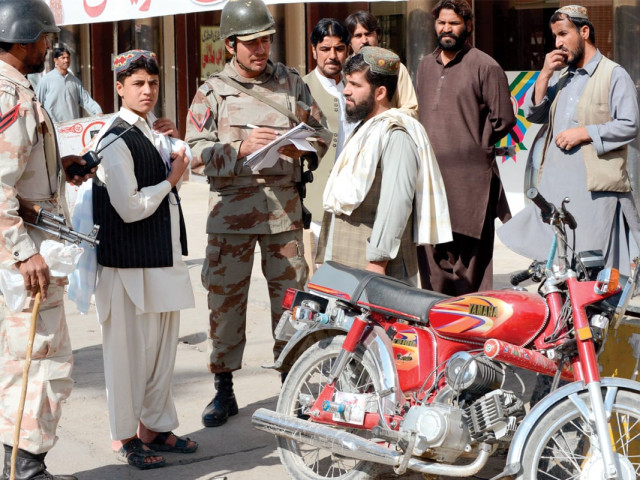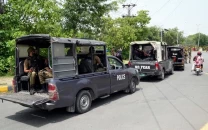Parliamentarians outraged: Malik’s defence of motorcycle ban finds no takers
Babar Awan, Raza Rabbani dismiss controversial move as unconstitutional.

A day after approving the bizarre security initiative, Interior Minister Rehman Malik attempted to put up an impassioned defence of his move to ban motorbikes in Karachi and Quetta for the first ten days of Muharram.
However, the country’s security czar came under intense fire from almost all quarters of Parliament on Friday, most notably from senior members of his own party, who said his moves were a violation of the Constitution.
On a point of order, several veteran Pakistan Peoples Party (PPP) senators including Raza Rabbani and former law minister Babar Awan challenged the authority of the federal interior ministry to impose a ban on motorbikes in Sindh and Balochistan through an executive order, deeming it interference in provincial matters.
“It is totally illegal and against the Constitution. Under clause 90(1), 99(3) and 97 of the Constitution, the interior minister cannot impose a ban on the provinces without the approval of the prime minister,” noted Awan. “This cannot be done by any federal minister. Essentially, this is the jurisdiction of the provincial government,” he maintained.
The former law minister had no qualms in dismissing briefings given by the interior ministry on the Karachi law and order situation ‘as political’, saying that they had nothing to do with either national interest or ground realities. “The briefings prepared in Islamabad are no of use in correcting the security situation in Karachi, neither have they ever borne fruit,” he added.
The interior minister, on the other hand, insisted that such extreme measures were taken on the basis of intelligence reports in order to protect processions. “You cannot challenge the wisdom of the government. We are in a state of war and cannot follow all the legal formalities while taking short-term security measure on special occasions,” he held. He added that he had already received approval from the prime minister.
While pointing out that motorcyclists were behind a majority of bomb blasts in 2011 and 2012, Malik also pointed a finger at Parliament itself. He said that it had failed to pass anti-terrorism bills or amend clauses of the Pakistan Penal Code (PPC) which would bring terrorists to justice. “We know who releases Malik Ishaq from jails, and there is need for a stringent Anti-Terrorism Act (ATA) to check this manipulation of law,” he demanded.
But the minister was instantly snubbed by Senator Rabbani, who said the government’s wisdom could always be challenged because it was directly answerable to Parliament. He contended that the proposed ATA bills could not be passed by Senate because of flaws in the legislation which would violate fundamental human rights and provide support for state terrorism through legalisation. “No government could be given the license to rule without the Constitution,” he maintained.
But every senator had a different person to blame for the cyclical violence in Karachi. Farhatullah Babar said a reason for the deteriorating law and order was that under-trial and convicted prisoners who were released on parole subsequently disappeared, and another was that there was no provision for protection of witnesses. Muttahida Qaumi Movement (MQM) Senator Nasreen Jalil, meanwhile, criticised the provincial government for not arresting terrorists and suggested that the Citizens Police Liaison Committee (CPLC) be strengthened.
Earlier, Jamiat Ulema-e-Islam-Fazl (JUI-F) Senator Maulana Ghafoor Haideri warned the government of serious consequences if the killing of seminary students in Karachi was not taken seriously, before staging a walkout along with his party’s lawmakers.
NA session
Later in the day, the interior minister faced less flak in the National Assembly – mainly because the opposition benches were almost completely vacant.
Bringing up his argument once again that motorcyclists were behind a large number of bomb attacks, Malik’s only challenger was Pakistan Muslim League Nawaz’s (PML-N’s) Abdul Qadir Baloch. “Humans are also used as bombs, would you ban them too?” the MNA asked the minister sarcastically. He added that 90 per cent of the workforce in the cities affected by the ban was dependent on motorbikes.
The minister reiterated his stance that his decision was backed on intelligent reports and that the Parliament had failed to deal with terrorism adequately.
But unlike the Senate, no member of the house stood up to challenge Malik besides Baloch. Even in the middle of Baloch’s speech, a group of MNAs surrounded the interior minister for personal work, some handing him documents, others getting his signatures.
Published in The Express Tribune, November 17th, 2012.



















COMMENTS
Comments are moderated and generally will be posted if they are on-topic and not abusive.
For more information, please see our Comments FAQ